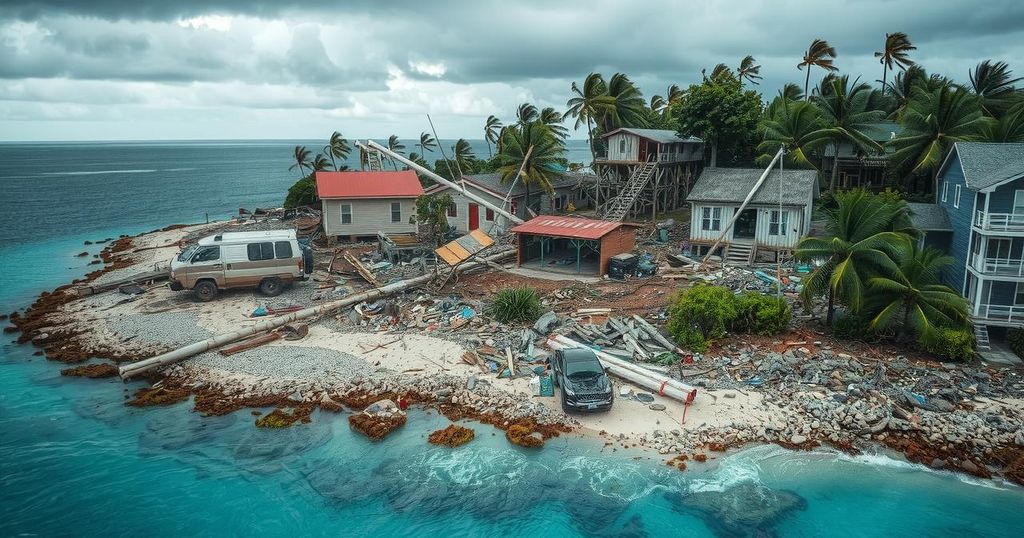Cyclone Chido, a Category 4 storm, devastated Mayotte in December, resulting in at least 35 fatalities and substantial destruction of infrastructure. The cyclone, the worst in 90 years, exposed vulnerabilities to climate change. Emergency aid is being mobilized by the European Commission and other nations to assist recovery efforts in the region, emphasizing the need for sustainable energy transitions to mitigate future impacts.
In December, Cyclone Chido, classified as a Category 4 storm, struck the archipelago of Mayotte with unprecedented ferocity, causing catastrophic devastation. This cyclone, described as the worst to impact the area in 90 years, claimed the lives of at least 35 individuals, and officials fear that this toll may increase. With wind speeds reaching 136 miles per hour, significant destruction occurred throughout the islands, with entire neighborhoods, schools, and hospitals being demolished. The aftermath left near two-thirds of the region inaccessible due to widespread power failures and compromised communication networks.
Estelle Youssouffa, a member of parliament representing Mayotte’s first constituency, emphasized the severity of the situation, stating, “Everything has been razed.” This underscores the grave challenges facing the islands as they begin to grapple with the cycle of recovery. Further complicating the region’s plight is its history with extreme weather, recalling the devastation of Cyclones Idai and Kenneth that inflicted severe damage upon neighboring Mozambique just five years prior.
The frequency and intensity of such cyclones are increasingly attributed to the impact of climate change, highlighting the vulnerability of Mayotte as outlined in the French Development Agency’s 2022-2026 strategy. As tropical cyclones are now forming in warmer and wetter climates, the repercussions for susceptible areas are dire. The European Commission, alongside aid from several countries, is mobilizing emergency assistance for Mayotte and Mozambique. This initiative includes nearly one million dollars in aid for water, shelter, and healthcare while the EU’s Copernicus Emergency Management Service is aiding relief efforts through mapping resources.
The devastation wrought by Cyclone Chido is a stark reminder of the urgent need for transitioning from fossil fuels to cleaner energy sources. The advancement of renewable energy technologies offers vital hope for mitigating the impacts of climate change in the long term, crucial for safeguarding the planet’s most vulnerable regions.
Such unprecedented natural disasters compel reflection on the safety and preparedness of communities often placed in the line of severe weather. Those witnessing the damage call for urgent action and support for the affected populations, fostering a commitment to sustainable practices to help prevent future catastrophes.
The article discusses the severe impact of Cyclone Chido, a Category 4 storm that struck the French archipelago of Mayotte in December, inflicting catastrophic damage reminiscent of the area’s worst cyclone in 90 years. The devastation has raised concerns about the vulnerability of the region to extreme weather events exacerbated by climate change. This cyclone followed years of similar disasters, raising the urgency for effective relief efforts and long-term climate adaptation strategies as highlighted by several authoritative bodies.
In conclusion, Cyclone Chido’s devastating impact on Mayotte reveals the increasing vulnerability of regions to extreme weather events, a situation exacerbated by climate change. The critical need for emergency aid, combined with a collective effort toward sustainable energy practices, is paramount. As communities work to recover from this disaster, it is essential to adopt measures that will enhance resilience against future climatic threats, ultimately prioritizing the safety and well-being of affected populations.
Original Source: www.thecooldown.com






